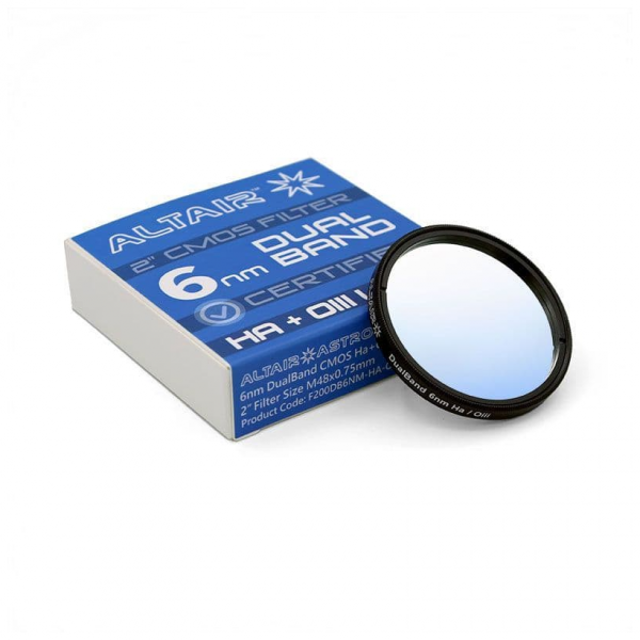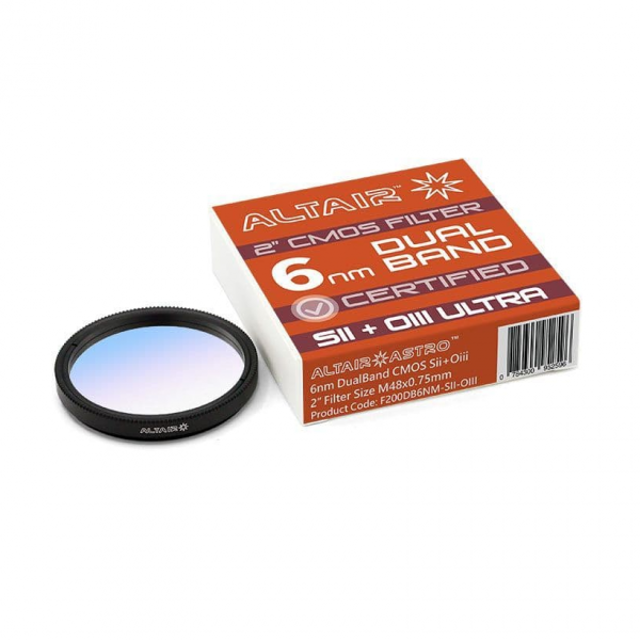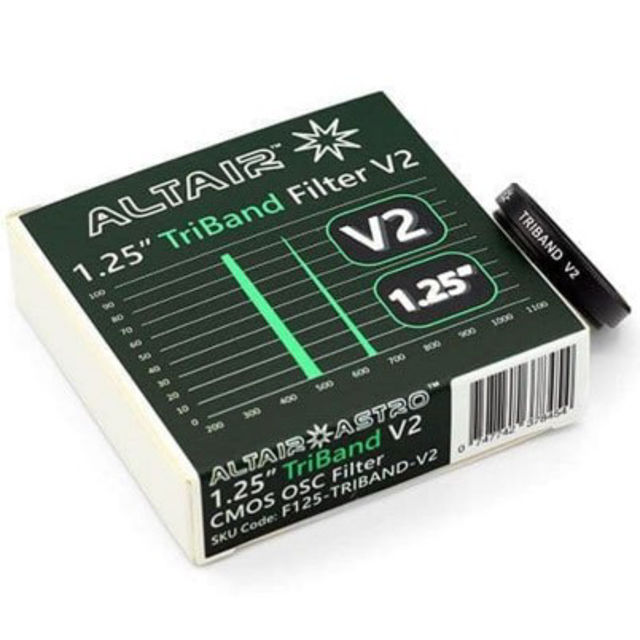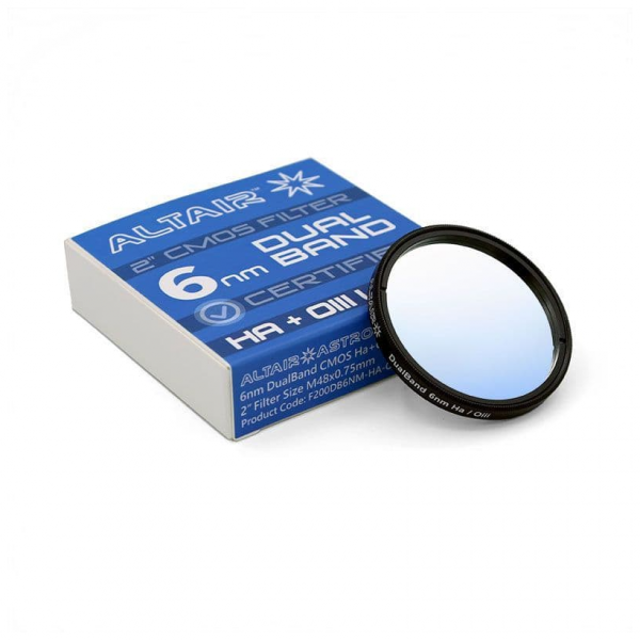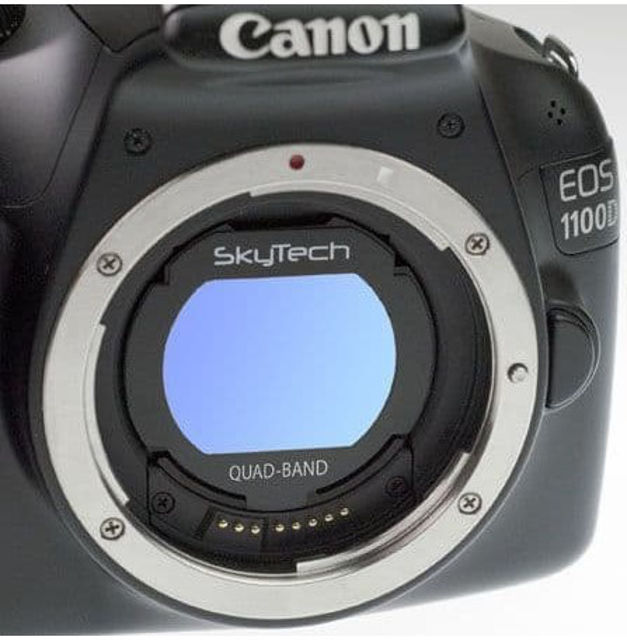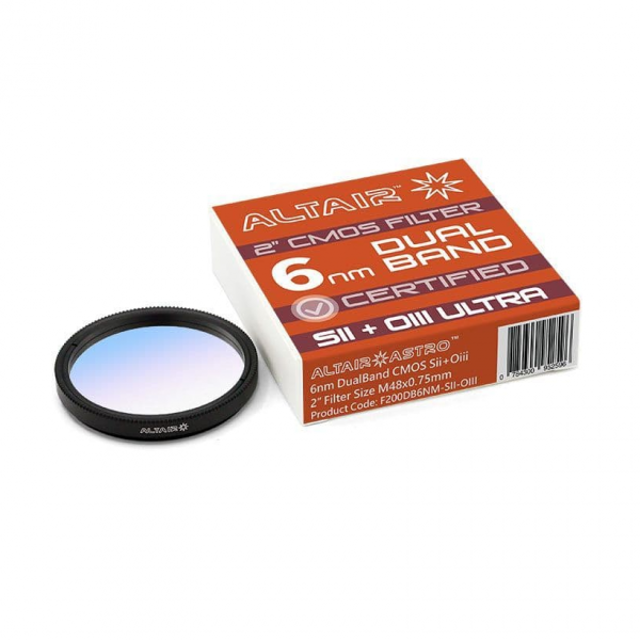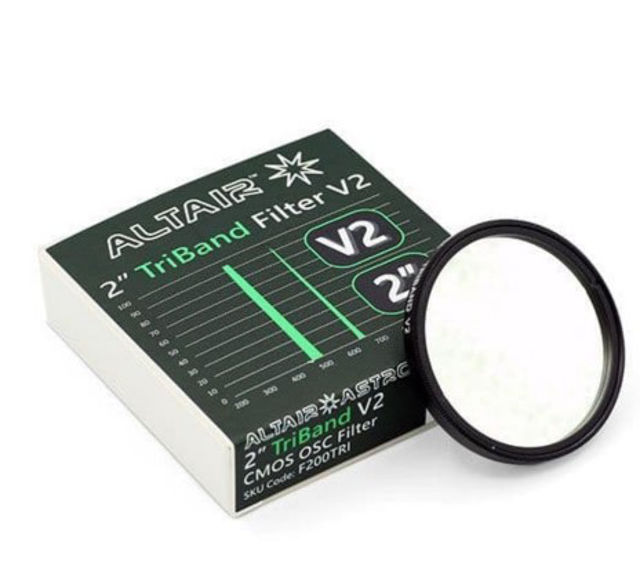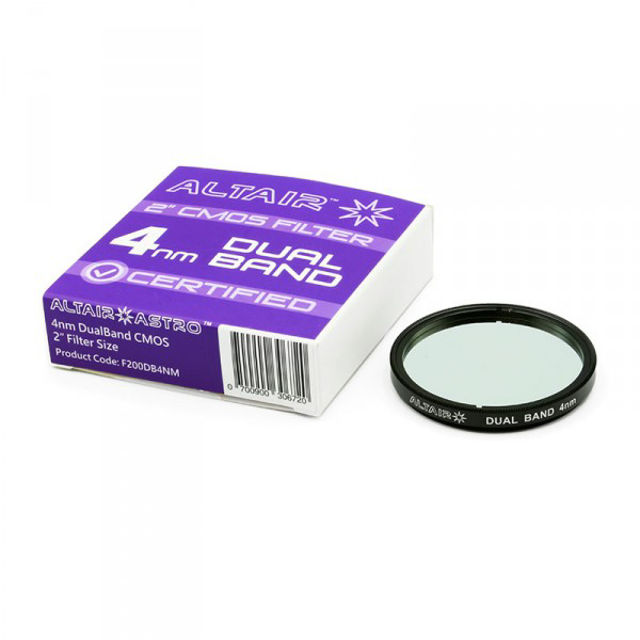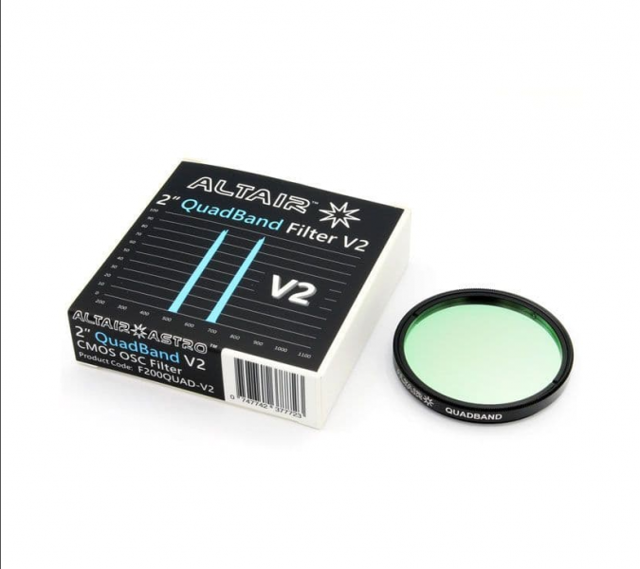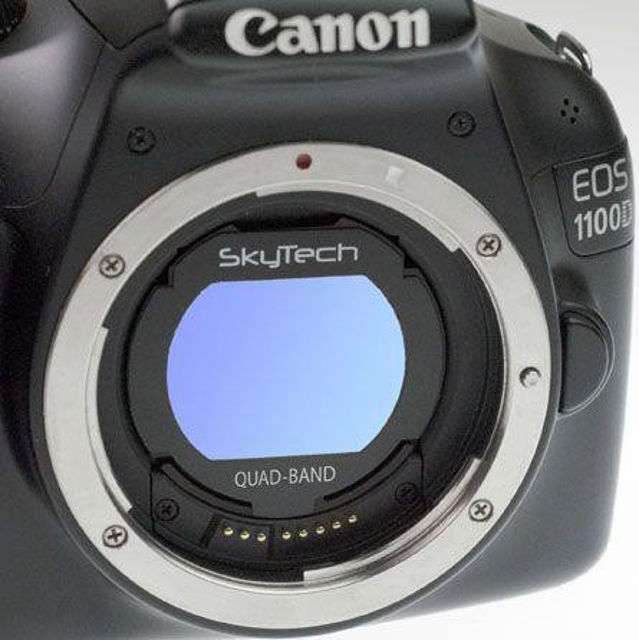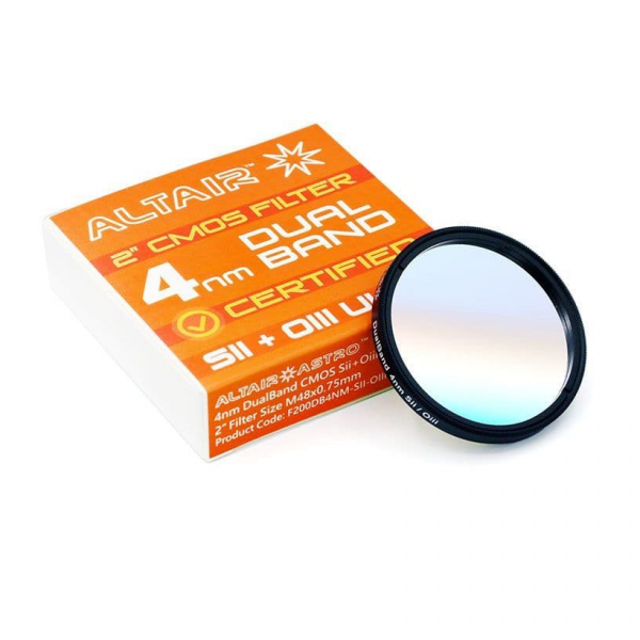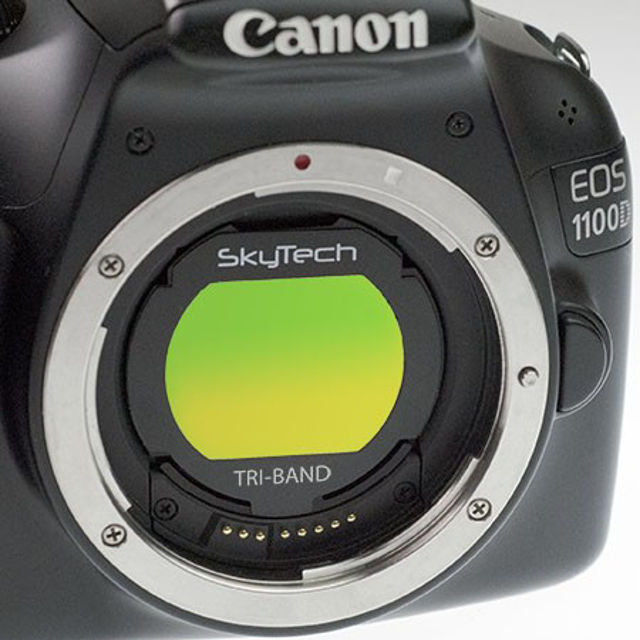Multiband-Filters
- Home /
- Optical Accessories /
- CCD Filter for Astrophotography /
- Multiband-Filters
Altair DualBand 6nm Filter Features:
- Capture the two main emission nebulae bands at the same time, whilst suppressing light pollution, moonlight, and airglow.
- Acquire more data in less time, opening up your imaging window, even into the summer months when it isn't quite dark.
- If you have the 6nm Ha/Sii Ultra filter and the Sii/Ha version, you can capture twice the Oiii data in each imaging session and combine them for true SHO Hubble style imaging with a colour camera!
- Extremely steep bandpass yields maximum contrast in extreme light pollution: 6nm FHWM centred on 500.7nm Oiii wavelength, and 5.5nm FHWM centred on the 656.28nm Ha wavelength.
- Halo suppression anti-reflective coating.
- Can be used with One Shot Colour (OSC) CMOS or mono astronomical cameras for luminance data.
- Includes UVIR blocking for both modified and un-modified DSLR cameras, plus an anti-reflection coating for the ultimate in contrast.
- Best performance at focal ratios at F4.8 or slower, however can be used as fast as F3.6, with minimal contrast impact (conservative estimate - faster may be possible). Like any dichroic filter, contrast increases as focal ratio number increases. More info about light pollution filter performance and focal ratio here.
209.00 € 183.92 €
Estimated delivery time : 1-2 weeks (valid for new orders)
Altair DualBand 6nm Filter Features:
- Capture the two main emission nebulae bands at the same time, whilst suppressing light pollution, moonlight, and airglow.
- Acquire more data in less time, opening up your imaging window, even into the summer months when it isn't quite dark.
- If you have the 6nm Sii Oiii Ultra filter and the Ha Oiii version, you can capture twice the Oiii data in each imaging session and combine them for true SHO Hubble style imaging with a colour camera!
- Extremely steep bandpass yields maximum contrast in extreme light pollution: 6nm FHWM centred on 500.7nm Oiii wavelength, and 5.5nm FHWM centred on the 671.6nm Sii wavelength.
- Halo suppression anti-reflective coating.
- Can be used with One Shot Colour (OSC) CMOS or mono astronomical cameras for luminance data.
- Includes UVIR blocking for both modified and un-modified DSLR cameras, plus an anti-reflection coating for the ultimate in contrast.
- Best performance at focal ratios at F4.8 or slower, however can be used as fast as F3.6, with minimal contrast impact (conservative estimate - faster may be possible). Like any dichroic filter, contrast increases as focal ratio number increases. More info about light pollution filter performance and focal ratio here.
209.00 € 183.92 €
Estimated delivery time : 1-2 weeks (valid for new orders)
The new TriBand V2 Filter
- Anti-Halo coating on both surfaces to reduce reflection artefacts from reducers and camera lenses.
- Increased blocking of UV, IR and unwanted visual range wavelengths. UV OD7 (T0.00001%) Visual OD5 (T0.001%) and IR OD4 (T0.01%) for the ultimate in skyglow blocking. This is an order of magnitude better than foreign filters.
- Higher transmission % of desired wavelengths Ttop 93% (Average 5% higher transmission of target wavelengths than V1). In general a 5% gain on foreign filters.
- Ha at 14nm and Oiii at 34nm FWHM for with less tail-off to reduce unwanted light pollution, whilst keeping transmission high compared to the V1.
159.00 € 139.92 €
Estimated delivery time : 1 week (valid for new orders)
Altair DualBand 6nm Filter Features:
- Capture the two main emission nebulae bands at the same time, whilst suppressing light pollution, moonlight, and airglow.
- Acquire more data in less time, opening up your imaging window, even into the summer months when it isn't quite dark.
- If you have the 6nm Ha/Sii Ultra filter and the Sii/Ha version, you can capture twice the Oiii data in each imaging session and combine them for true SHO Hubble style imaging with a colour camera!
- Extremely steep bandpass yields maximum contrast in extreme light pollution: 6nm FHWM centred on 500.7nm Oiii wavelength, and 5.5nm FHWM centred on the 656.28nm Ha wavelength.
- Halo suppression anti-reflective coating.
- Can be used with One Shot Colour (OSC) CMOS or mono astronomical cameras for luminance data.
- Includes UVIR blocking for both modified and un-modified DSLR cameras, plus an anti-reflection coating for the ultimate in contrast.
- Best performance at focal ratios at F4.8 or slower, however can be used as fast as F3.6, with minimal contrast impact (conservative estimate - faster may be possible). Like any dichroic filter, contrast increases as focal ratio number increases. More info about light pollution filter performance and focal ratio here.
309.00 € 271.92 €
Estimated delivery time : 1-2 weeks (valid for new orders)
High quality filter for CMOS photography with the following features:
- 1st band, CWL495nm FWHM35nm
- 2nd band, CWL 660nm FWHM 35nm
- 1mm thick optical glass with 30 arc sec parallelism.
- UVIR Block and Anti-Reflection Coating.
159.00 € 139.92 €
Estimated delivery time : 2-4 weeks (valid for new orders)
Altair DualBand 6nm Filter Features:
- Capture the two main emission nebulae bands at the same time, whilst suppressing light pollution, moonlight, and airglow.
- Acquire more data in less time, opening up your imaging window, even into the summer months when it isn't quite dark.
- If you have the 6nm Sii Oiii Ultra filter and the Ha Oiii version, you can capture twice the Oiii data in each imaging session and combine them for true SHO Hubble style imaging with a colour camera!
- Extremely steep bandpass yields maximum contrast in extreme light pollution: 6nm FHWM centred on 500.7nm Oiii wavelength, and 5.5nm FHWM centred on the 671.6nm Sii wavelength.
- Halo suppression anti-reflective coating.
- Can be used with One Shot Colour (OSC) CMOS or mono astronomical cameras for luminance data.
- Includes UVIR blocking for both modified and un-modified DSLR cameras, plus an anti-reflection coating for the ultimate in contrast.
- Best performance at focal ratios at F4.8 or slower, however can be used as fast as F3.6, with minimal contrast impact (conservative estimate - faster may be possible). Like any dichroic filter, contrast increases as focal ratio number increases. More info about light pollution filter performance and focal ratio here.
309.00 € 271.92 €
Estimated delivery time : 1-2 weeks (valid for new orders)
The new TriBand V2 Filter
- Anti-Halo coating on both surfaces to reduce reflection artefacts from reducers and camera lenses.
- Increased blocking of UV, IR and unwanted visual range wavelengths. UV OD7 (T0.00001%) Visual OD5 (T0.001%) and IR OD4 (T0.01%) for the ultimate in skyglow blocking. This is an order of magnitude better than foreign filters.
- Higher transmission % of desired wavelengths Ttop 93% (Average 5% higher transmission of target wavelengths than V1). In general a 5% gain on foreign filters.
- Ha at 14nm and Oiii at 34nm FWHM for with less tail-off to reduce unwanted light pollution, whilst keeping transmission high compared to the V1.
159.00 € 139.92 €
Estimated delivery time : 1 week (valid for new orders)
This filter transmits only the H and Oiii light from emission nebulae, with almost total suppression of unwanted light....
609.00 € 535.92 €
Estimated delivery time : 2-4 weeks (valid for new orders)
Altair Quad-Band 2" Filter for OSC CMOS, CCD and Modified or Unmodded DSLR cameras.
This is the new QuadBand V2 Coating technology which includes:
- Halo suppression. We have not had any reports of halos caused by this filter in testing.
- Increased blocking of UV, IR and unwanted visual range wavelengths. UV OD7 (T0.00001%) Visual OD5 (T0.001%) and IR OD4 (T0.01%) for the ultimate in skyglow blocking.
- Higher transmission % of desired wavelengths Ttop 95% (Average 5% higher transmission of desired wavelengths).
- Ha and Oiii wavelengths at 35nm FWHM for with less tail-off to reduce unwanted light pollution.
159.00 € 139.92 €
Estimated delivery time : 2-4 weeks (valid for new orders)
SkyTech Quad-Band EOS Clip Filter for DSLR cameras (including astro-modified) Narrowband Bi-Colour imaging is a growing new trend in astrophotography, especially popular in light polluted areas, or for imaging in rural areas in moonlight.
159.00 € 139.92 €
Estimated delivery time : 2-4 weeks (valid for new orders)
Altair DualBand 4nm Filter Features:
- Capture the two main emission nebulae bands at the same time, whilst suppressing light pollution, moonlight, and airglow.
- More data in less time, opening up your imaging window, even into the summer months when it isn't quite dark yet. Capture twice the Oiii data, whilst obtaining Sii to complement the Altair Ha Oiii DualBand filter.
- Extremely steep bandpass yields maximum contrast in extreme light pollution: 4nm FHWM centred on 500.7nm Oiii wavelength, and 4nm FHWM centred on the 671.6nm Sii wavelength.
- Halo suppression anti-reflective coating.
- Can be used with One Shot Colour (OSC) CMOS or mono astronomical cameras for luminance data.
- Includes UVIR blocking for both modified and un-modified DSLR cameras.
- Best performance at focal ratios as fast as F4.8, with contrast increasing as focal ratio increases. More info about light pollution filter performance and focal ratio here.
- The 2" filter has standard M48x0.75mm thread, and fits inside the Altair Magnetic Filter holders, standard 2" filter wheels, plus the Altair Canon / Nikon DSLR lens to astro CMOS adaptors.
609.00 € 535.92 €
Estimated delivery time : 1-2 weeks (valid for new orders)
SkyTech TriBand Canon EOS Clip Filter
Narrowband Bi-Colour imaging is a growing new trend in astrophotography, especially popular in light polluted areas, or for imaging in rural areas in moonlight.
Narrowband Bi-Colour imaging is a growing new trend in astrophotography, especially popular in light polluted areas, or for imaging in rural areas in moonlight.
159.00 € 139.92 €
Estimated delivery time : 2-4 weeks (valid for new orders)
- 1
- 2
